Boyfriend Demands Girlfriend Speak English to Her Dog Because He Feels “Left Out”
Some arguments don’t start with raised voices or harsh words. Sometimes, they begin quietly—with something as innocent as a person whispering to their dog in a language that feels like home.
What might look like a small, harmless act can peel back layers of deeper tension about belonging, comfort, and who truly feels “at home” in a relationship.
Language is more than just words. It carries memories, humor, tone, and emotion. For many, it’s tied to identity—the way they express love, calm, or care.
Switching tongues can feel like switching selves, and for someone whose native language carries their most natural warmth, being told not to use it can feel like being asked to mute a part of who they are.
But when two people come from different linguistic worlds, those differences can quietly build walls. To one, it might feel like a private space of comfort. To the other, it might look like exclusion. And when affection for a pet intertwines with cultural pride and emotional security, the tension deepens.
In this story, a woman’s tender act of comforting her anxious dog became the spark for a much larger argument about language, belonging, and respect—testing just how much understanding love can really hold.
It started as an ordinary moment of comfort between a woman and her anxious dog. But a few soft words in her native language soon sparked a much bigger argument.
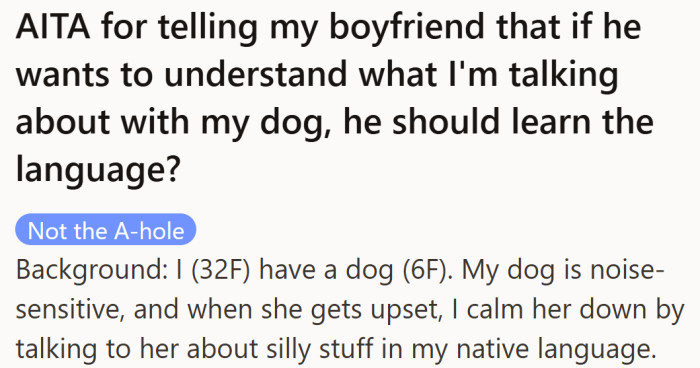
The couple’s relationship had been smooth until a casual moment with her dog exposed a deeper divide about culture and communication.
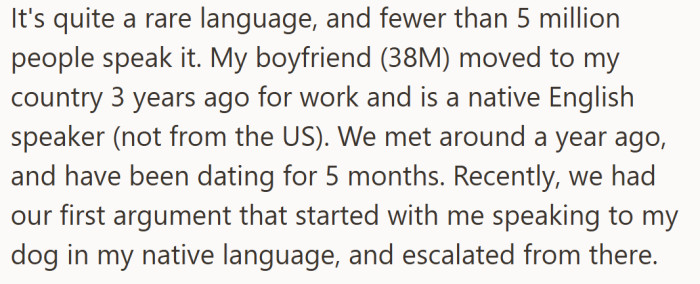
A sudden noise, a scared dog, and a lighthearted joke. It should’ve ended there, but it didn’t.

Language and Identity
Dr. John Van Epp, a renowned relationship expert, highlights that language is deeply tied to identity and emotional safety. When someone communicates in their native tongue, especially with a pet, it provides comfort and a sense of belonging.
This situation reflects a broader issue in relationships where one partner feels excluded. Van Epp suggests that addressing these feelings openly can foster understanding and connection, allowing both partners to appreciate each other's backgrounds.
Dr. Carla Harris, a finance expert and motivational speaker, often speaks about the power of communication in building strong relationships. She highlights that addressing feelings of exclusion can lead to more effective partnerships.
Harris encourages couples to have heart-to-heart conversations about their emotional needs. This can create a more supportive environment, allowing both partners to feel valued and understood.
What began as a simple explanation quickly turned personal when he said her language made him feel excluded.
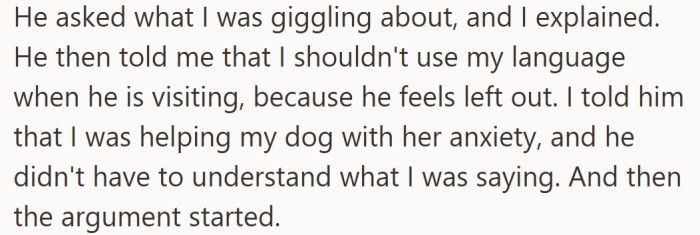
What he saw as basic manners, she saw as control. The argument shifted from a simple misunderstanding to a clash of values.
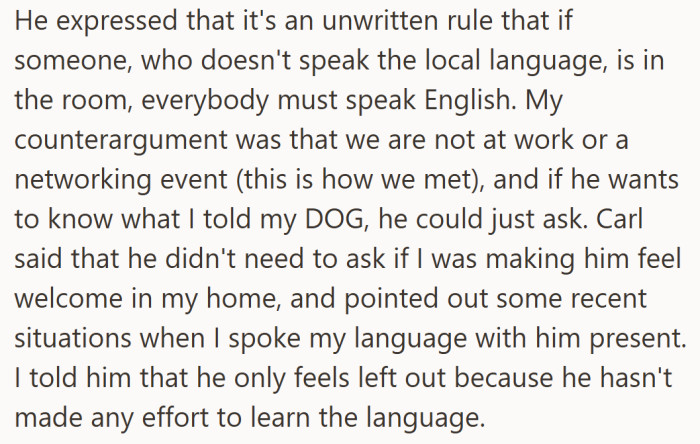
When he dismissed her language as impractical, she couldn’t help but question his priorities—and fire back with a sharp reply.
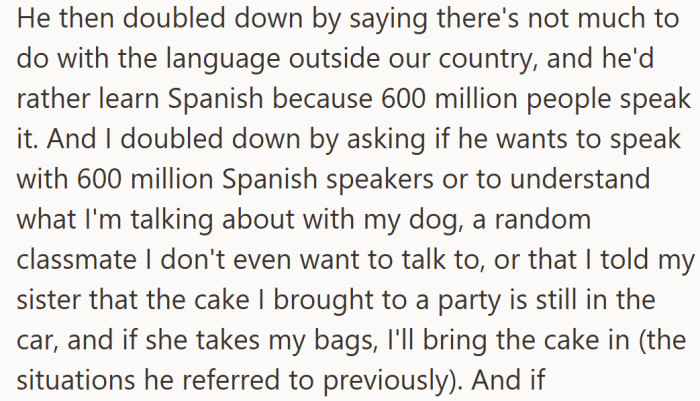
Dr. Michele Gelfand, a cultural psychologist, notes that language can serve as a cultural bridge in relationships. When partners share their backgrounds, they enrich each other's experiences. This incident points to a potential lack of cultural sensitivity.
Gelfand advises that couples should strive for mutual respect and understanding, encouraging open dialogues about cultural practices. Such discussions can help alleviate feelings of exclusion and promote inclusivity in the relationship.
Tired of defending herself, she drew a line. If he wouldn’t try to understand her world, she wouldn’t keep translating it for him.

By the end of the night, silence filled the room—neither ready to back down, both feeling misunderstood.

She knew her dog didn’t care what language she used, but to her, switching tongues would feel completely unnatural.
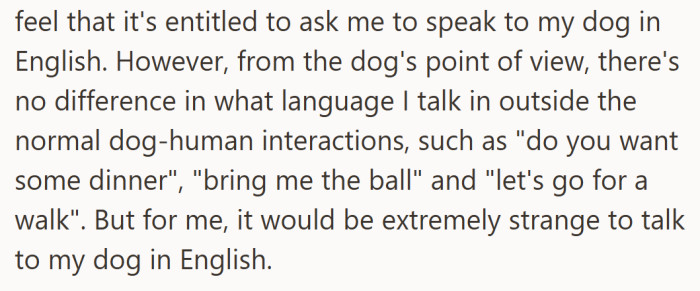
Navigating Emotional Needs
Dr. Virginia Satir, a pioneering family therapist, emphasizes the importance of expressing emotional needs in relationships. The boyfriend's demand for his girlfriend to speak English may stem from insecurity rather than a genuine concern for the dog.
Satir advocates for couples to practice emotional honesty by sharing their vulnerabilities. This approach can lead to deeper connections and greater empathy, ensuring both partners feel heard and valued.
“If he’s jealous of a dog, imagine how he’d handle bilingual kids.”
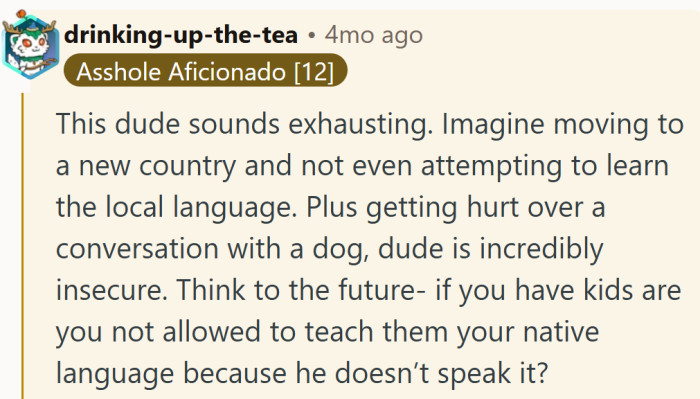
It’s hard to feel sorry for someone demanding inclusion without ever trying to belong.

It’s easy to forget how much effort bilingual people already put in just to meet others halfway.
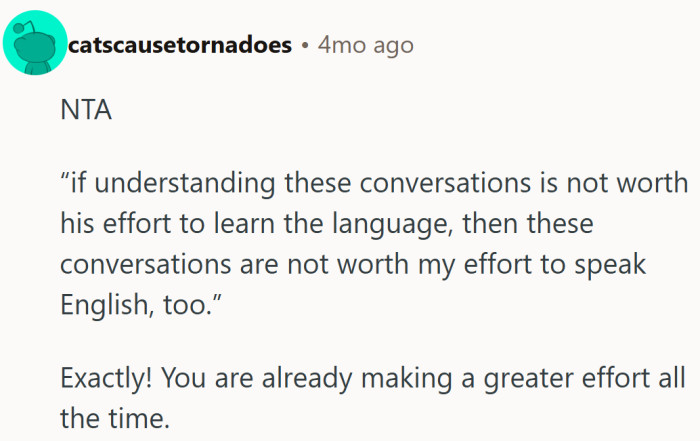
Dr. Susan David, an expert in emotional agility, suggests that managing feelings of exclusion requires self-awareness. The boyfriend's feelings might indicate a need for validation, which could be addressed through open conversations.
David encourages couples to explore their emotional landscapes together, identifying triggers and fostering resilience. By creating a safe space for such discussions, partners can navigate through misunderstandings and strengthen their bond.
Respect starts with effort—and in this case, even a few words would’ve gone a long way.
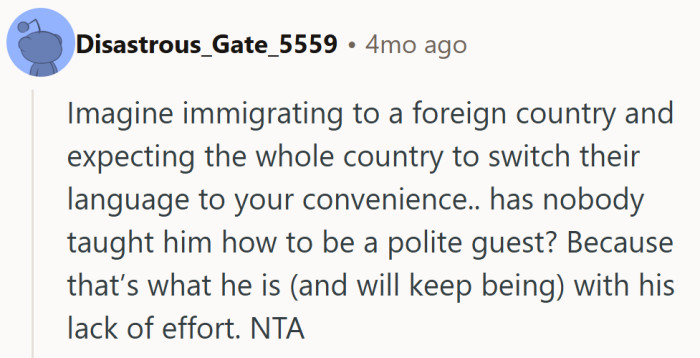
For many people, speaking to animals in their native tongue isn’t odd at all—it’s a small piece of home that never needs translation.
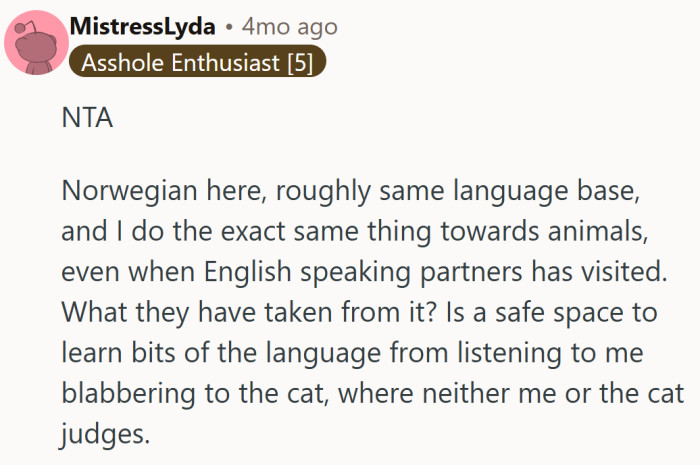
If he’s sulking over pet talk now, imagine the drama when the cat gets a turn.

Practical Communication Tips
To improve communication and reduce misunderstandings, therapists recommend setting aside regular times for open dialogue. This allows partners to express their feelings without judgment.
Dr. Tara Brach, a psychologist and meditation teacher, emphasizes the importance of active listening. Utilizing reflective listening techniques, where partners repeat back what they’ve heard, can clarify misunderstandings and create an empathetic atmosphere.
When the language barrier starts looking a lot like a character flaw, that’s more than a translation issue.

Imagine being jealous of a dog’s private conversations—now that’s next-level insecurity.

It’s not just a comfort thing; dogs recognize tone and rhythm, which makes her native language part of their bond.
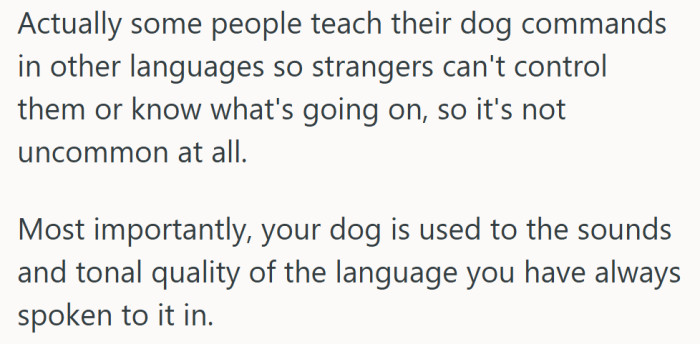
Dr. Harville Hendrix, a relationship expert, points out that language can manifest as a tool for connection or disconnection in couples. This incident may reflect underlying insecurities that both partners need to address.
Hendrix encourages couples to explore their shared experiences and feelings. Engaging in activities that highlight their bond can help overcome challenges and enhance their emotional intimacy.
Turns out the dog’s not being dramatic—it’s just fluent in “comfort.”

Comfort isn’t about words—it’s about tone, warmth, and familiarity, no matter the language.

At this point, it’s less about language and more about basic understanding, something he seems to be struggling with.

Cultural Sensitivity Matters
Dr. Erin Meyer, an expert in cultural differences, emphasizes the significance of understanding how cultural backgrounds shape communication styles. This incident underscores the need for partners to appreciate each other's linguistic choices.
Meyer suggests that couples participate in cultural exchange activities, allowing them to appreciate and celebrate their differences. This approach can foster unity and reduce feelings of exclusion, creating a more harmonious relationship.
Some people see language as a bridge, others as a private refuge. For couples who come from different cultures, the challenge lies in balancing both, the need to feel included and the right to feel at ease.
Was this simply a misunderstanding, or a red flag about respect and effort? At what point does “feeling left out” stop being about love and start being about control? Share this story with someone who’s ever struggled to make two worlds, and two hearts, truly understand each other.
Expert Opinion
This situation highlights how language is deeply tied to identity and emotional expression. When the boyfriend feels excluded, it might stem from insecurities about belonging, which can trigger defensiveness and a need for control. For the girlfriend, speaking in her native tongue is a source of comfort and connection, suggesting that the core of their conflict isn't just about language, but about navigating cultural differences and mutual respect in their relationship.Solutions & Coping Strategies
In summary, the situation reflects deeper emotional currents in relationships that can often be overlooked. By fostering open communication, understanding cultural differences, and practicing emotional honesty, couples can navigate these complexities effectively.
Experts suggest that engaging in regular dialogues about feelings and needs can lead to greater emotional intimacy. Ultimately, prioritizing understanding can transform potential conflicts into opportunities for growth and connection, ensuring both partners feel valued in their relationship.



